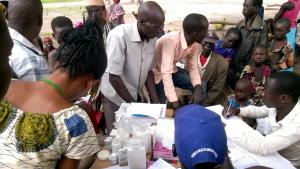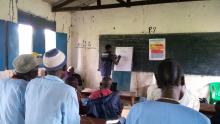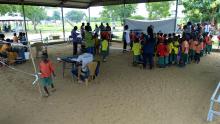WHO’s emergency mobile medical teams provide lifesaving health services in famine-affected and hard-to-reach areas of South Sudan
26 September 2017, Juba – WHO’s emergency medical mobile teams are providing lifesaving health services to alleviate the myriad of public health challenges faced in famine-affected and hard-to-reach areas of South Sudan.
The team includes one doctor, nurse, nutritionist and community health worker. They support partners in remote locations with case management of patients, vaccinations, setting up of cholera treatment centers and units in areas reporting outbreaks, and help partners to set up mobile clinics.
The teams depend on the WHO’s core supplies of Interagency Emergency Health kits (IEHK), severe acute malnutrition (SAM) kits and trauma kits, among others, to distribute to local partners. For example, one IEHK is designed to meet the basic health needs of 10 000 people for approximately 3 months.
“Thanks to the generous contribution of the United Nations Central Emergency Response Fund (CERF), we are reaching more internally displaced persons and communities in remote and inaccessible areas, including famine-affected, with critical medical assistance,” says Mr Evans Liyosi, WHO Representative a.i to South Sudan. “Despite many challenges accessing locations, the health workers see the impact of their efforts.”
WHO continues to respond to urgent medical needs and maintain essential programs across South Sudan, despite growing challenges, including attacks on health care facilities. Since beginning operations in May 2017, the teams, in partnership with the Ministry of Health and NGOs, administered 4 000 doses of oral cholera vaccines (OCVs) in Don Bosco area of Juba County; reached around 1 600 patients with lifesaving drugs; trained 50 frontline health care workers on case management of malaria and cholera and set up four mobile clinics for partners.
Since the conflict in South Sudan escalated in July 2016, two million people remain displaced internally, with most fleeing to remote areas difficult to provide health services. Some 5.4 million people are in need of health assistance, and 2.7 million people are targeted by the WHO-led health cluster. Medical supplies are in chronic shortage. Meeting the need for basic health services continues to be a challenge throughout the country.
Getting the job done
The teams often work without a break to treat people in remote communities who have been cut off due to conflict, flooding and damaged roads.
“It’s very satisfying. I’m very happy I can help people and take care of the vulnerable, conflict-affected populations,” says, Jacqueline Maina, WHO Emergency Mobile Medical Team Coordinator.
WHO has been playing major role in reaching people with virtually no health services through the provision of Interagency Emergency Health Kits (IEHKs) and Diarrhoeal Disease kits (DDKs). WHO has also provided tents to the Ministry of Health and partners as well as deployed rapid response teams (RRTs) from national and state levels to detect and respond to disease outbreaks.





